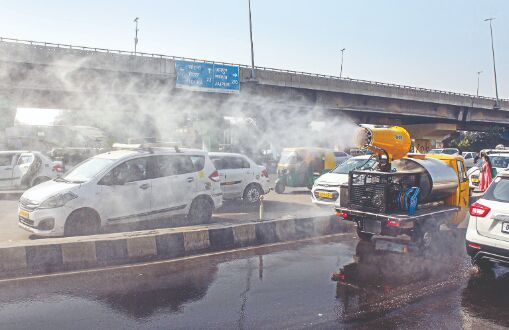SC reimposes construction ban in NCR but with conditions

New Delhi: After pulling up authorities here for only planning for restrictions after the air quality worsens and not in anticipation of it, the Supreme Court on Wednesday reimposed the ban on construction activities in Delhi-NCR, days after the Commission for Air Quality Management in the NCR allowed it to be lifted.
Significantly, the court of the Chief Justice exempted certain works from the ban — directing that activities such as plumbing work, interior decoration, electrical work and carpentry should be allowed during this time.
The second condition that the top court imposed was that state governments in the NCR should use the funds collected as labour cess for the welfare of construction workers to provide them with compensation for the wages lost due to the ban as per the Minimum Wages Act of the concerned worker groups.
Earlier during the hearing on Wednesday, the court asked why Delhiites should suffer very poor air quality and called for anticipatory preventive steps to deal with the situation before it ever becomes severe — instead of imposing restrictions after the situation worsens, observing that any dip in pollution is because of the wind, an "act of God, which too may come to zero by the end of the day".
The court also wondered what signal the country is sending to the world when the national Capital is hit by air pollution, and told the Centre and the National Capital Region (NCR) states to continue with their measures to curb air pollution but also look for ways to take steps in anticipation on bad air based on wind and weather patterns.
"Graded response to deal with the spike in air pollution should be taken before the situation becomes severe," a special bench headed by Chief Justice N V Ramana said and made it clear that it will not close the pollution case and continue the hearing even if pollution comes down by "virtue of God's act" or restrictions.
"Why should Delhiites suffer this severe and very poor air quality?" the Apex Court asked. This is the national Capital. Look at the signal we are sending to the world. You can stop these (pollution causing) activities in anticipation itself..."
The bench, also comprising Justices DY Chandrachud and Surya Kant, went on to suggest evolving a statistical model for Delhi with the help of the Indian Meteorological Department (IMD) to anticipate a weather situation and take advance measures before the air quality deteriorates.
The bench said the Indian Meteorological Department (IMD), which now has sophisticated mechanisms and tools, must be having statistical data on expected wind direction and the time period when the air quality worsens and they can be used in evolving preventive actions in anticipation by the Commission for Air Quality Management in the NCR and Adjoining Areas.
At the outset, S-G Tushar Mehta referred to the measures which are still in force to deal with the spike in air pollution, adding that more mechanised road sweepers and sprinklers had been deployed but the court called them ad-hoc measures and said the CAQM must use "science-based" models to predict patterns and take anticipatory measures.
"Take the (existing) measures for the next two-three days and we will hear this matter next Monday. In the meantime if pollution becomes 100 (AQI) etc then you can lift some ban," it said.
The court said that so long as the seriousness is there, it will have to hear this matter almost every day or on alternate days. "You are saying (AQI) 290 and now we have just seen that it is 381 at present and wind speed is at 3 km and so this 290 is not correct," it said during the hearing.
On the issue of construction workers, the bench said the states have huge funds on account of labour cess collected from real estate firms and that can be used for paying the workmen who have been deprived of their livelihood due to the ban. "... I know some states have thousands of crores of rupees. Let them pay the workers for the last four-five days," the bench said.
The top court, which discussed the issue of stubble burning and the problems faced by farmers with the lawyers, once again came down on bureaucrats for their alleged inaction in dealing with this aspect.
"Mr (Tushar) Mehta (Solicitor General) as a government lawyer or lawyers and judges we are using our common sense and discussing this issue and what the bureaucracy has been doing all these years and can't they go and meet the farmers. I do not know what they are doing.
"Let the Secretaries of the Central and state government sit for two days, discuss the issue. They can go to the field and talk to the farmers and decide," said the bench.



